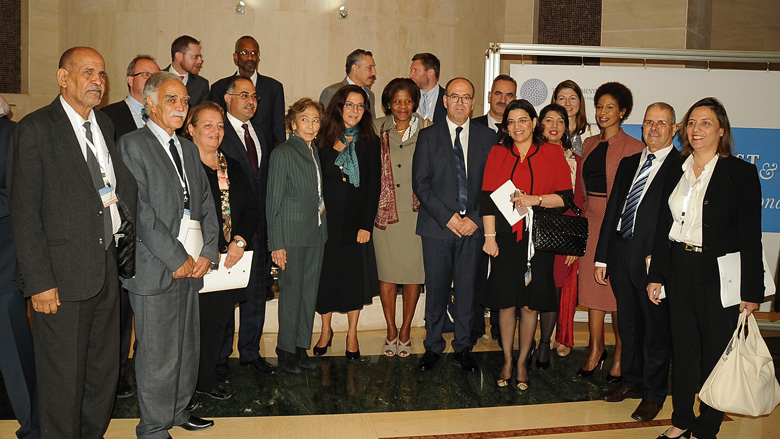Education and subsidy reform will be the focus areas of the regional chapter

World Bank Group
Education and subsidy reform will be the focus areas of the regional chapter
The Second Conference of the MENA chapter of the Parliamentary Network on the World Bank Group (WBG) and the International Monetary Fund (IMF) closed on Wednesday this week with a roadmap defining common grounds to exchange and build on successful development experiences in the region. In this year’s meeting, which was hosted by the Moroccan Parliament, deputies from Morocco, Algeria, Djibouti, Saudi Arabia, Egypt, Iraq, Iran, and Tunisia brought in their respective views of the regions’ challenges and exposed their country contexts and development constraints. They agreed on the need to build social cohesion through a renewed social contract, expanding opportunities for youth and enhancing governance across sectors.
In his opening address, President of the Morocco House of Councilors, Hakim Benchemass, stressed the need to do more to enhance the performance of public services, namely education, to address the region’s pressing development constraints. Marie Francoise Marie Nelly, World Bank Country Director for the Maghreb and Jihad Azour, IMF Director of the Middle East and Central Asia Department, stressed the need for more inclusive growth to tackle extreme poverty and reduce disparities.
“This is a great opportunity for Parliamentarians in the region to convene and discuss the common challenges their countries are facing. We are glad to see such level of ownership and momentum within the MENA Chapter” said Marie Françoise Marie-Nelly, World Bank Maghreb Country director. “In the World Bank and the IMF, we stand ready to provide the needed expertise and share knowledge to help Parliamentarians grasp issues such as education performance and subsidy reform. At their request, we will also provide support to chapters to help them tackle specific challenges for their respective countries.”
The conference set a regional collaboration agenda for the year ahead focusing on education performance and subsidy reform to improve targeting of social safety nets towards the most vulnerable populations.
“Growth in MENA is still too low to reduce high unemployment, especially among youth and women” said the IMF’s Jihad Azour. “To enhance growth prospects for the region, policies should ensure fiscal sustainability while allowing for higher investment and social spending, reform labor markets and educational systems, improve governance, and promote the use of technology and access to finance”
Olfa Soukri Cherif, President of the MENA Chapter and Vice-President of the Parliamentary Network on the World Bank & IMF, stressed the role of the Chapter as a platform for knowledge sharing and exchange on best practices. “The Parliamentary Network Chapter gives parliamentarians the opportunity for a dialogue with donors - something usually reserved to governments” she said.
To echo Soukri Cherif’s call, Parliamentarians addressed the World Bank and IMF representatives to demand a deeper dialogue with the development institutions to mutually exchange on countries’ development priorities and to have greater support to build Parliamentarians’ capacities in budget oversight and monitoring of public policies. They sought to gain greater understanding of the institutions’ mandate and how they can play a greater role to spur growth and competitiveness in a region marred by instability and conflict.
The Parliamentary Network, initially founded in 2000 as an independent, non-governmental organization, provides a platform for Parliamentarians from WBG and IMF member countries to advocate for increased accountability and transparency in development cooperation. The MENA Chapter of the Parliamentary Network acts as a platform for parliamentarians from the region to exchange knowledge and experiences on how best to fulfill their role as representatives of the people, and as actors of change to tackle development challenges in their countries and across the MENA region. The third yearly conference of the MENA chapter shall convene next year in Egypt.
"Human Capital in the MENA region", Fadila Caillaud, Human Development Global Practice, World Bank
"Managing migratory flows in the MENA region", Jason Gagnon, Migration and Skills Unit, OECD Development Centre